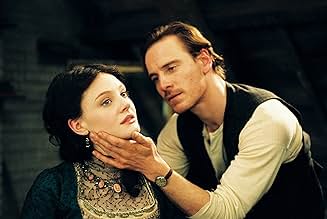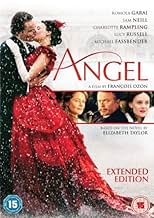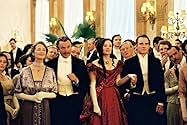IMDb RATING
5.8/10
5.7K
YOUR RATING
The rise and fall of a young eccentric British writer, in the early 20th century.The rise and fall of a young eccentric British writer, in the early 20th century.The rise and fall of a young eccentric British writer, in the early 20th century.
- Awards
- 1 win & 3 nominations total
Geoffrey Streatfeild
- Sebastian
- (as Geoffrey Streatfield)
Featured reviews
Based on the novel by Elizabeth Taylor, this Francois Ozon directed movie was the closing film of the Berlin Film Festival last year, and while it played out like a biography of a fictional character, you can't help but to imagine how close it seemed to the flamboyance of the other Liz Taylor being infused into the titular character.
Movies based on biographies, such as Miss Potter with Rene Zellweger and La Vie En Rose with Marion Cotillard, seem to follow a formula of rags to riches, and basically living the dream that no one had imagined was possible. Naturally, being blessed with a talent and a gift helps too, and with Angel Deverell (Romola Garai), hers was a steely resolve of wanting to break out of her poverty cycle through her writing, an aspiring novelist with limited life experience, relying solely on her vivid imagination to paint literary marvels with her firm grasp of language, constructing sentences like a wordsmith many times her age.
What made her character compelling to watch and follow, is her living in a fantasy world she constructs for herself, which suits her perfectly as it provides for and fuels her imagination with romantic stories to enchant and endear herself to her readers. It shields her from her insecurities, but in doing so, she slowly isolates herself into her view of Paradise, and becomes a chronic liar, which I felt she's constantly aware of, but is ashamed to admit any stain in the perfect world.
Delivered in two distinct acts, things start to change when she meets the Howe-Nevisons. Nora (Lucy Russell), probably her #1 fan who simply worships the ground she treads on, and offers to be her personal assistant, and her brother Esme (Michael Fassbender from 300 who said they'll fight in the shade!), with whom Angel falls head over heels for. And this stifling relationship takes a toil on all parties involved, with shades of possible lesbianism played down in the film (though I'm unsure what became of it in the novel). While Angel had her break from Theo (Sam Neill) the publisher who believed in her, Esme the aspiring painter has none, besides Angel who would probably say Yes to anything he says. And his portrait of her probably was the highlight for me in the movie. If a portrait painter needs to, and can peer directly into your innermost soul and bring whatever qualities he sees in you onto the canvas, then Esme would have succeeded with his god-ugly picture of Angel, reinforces meaning of being beautiful on the outside. but ugly on the inside.
The special effects were quite badly done, and perhaps deliberately too, as it's made up of very obviously superimposed shots of backgrounds that no longer exist because of modernization. Other than that, the rest of the production values are high, and the costumes too which Angel decked herself in, are quite a sight to behold, especially when there's a call for a change in colours to reflect the mood of the story as it wore on.
But what made this movie very palatable, is how Romola Garai carried the role through the story. You can just about believe the very naiveness and devil may care attitude that her Angel brings, however always seemingly able to hide and bury her true feelings deep within herself, and being a master manipulator also helped loads. Like how Charlotte Rampling's character of the publisher's wife reflected, you just can't help but to pity Angel, despite her pomp, flamboyance and hypocrisy.
So if you're interesting in a movie that provides avenue for an intriguing study of a person putting on a very fake mask, then Angel, despite its title, will be the movie for you to examine human traits which are anything but angelic.
Movies based on biographies, such as Miss Potter with Rene Zellweger and La Vie En Rose with Marion Cotillard, seem to follow a formula of rags to riches, and basically living the dream that no one had imagined was possible. Naturally, being blessed with a talent and a gift helps too, and with Angel Deverell (Romola Garai), hers was a steely resolve of wanting to break out of her poverty cycle through her writing, an aspiring novelist with limited life experience, relying solely on her vivid imagination to paint literary marvels with her firm grasp of language, constructing sentences like a wordsmith many times her age.
What made her character compelling to watch and follow, is her living in a fantasy world she constructs for herself, which suits her perfectly as it provides for and fuels her imagination with romantic stories to enchant and endear herself to her readers. It shields her from her insecurities, but in doing so, she slowly isolates herself into her view of Paradise, and becomes a chronic liar, which I felt she's constantly aware of, but is ashamed to admit any stain in the perfect world.
Delivered in two distinct acts, things start to change when she meets the Howe-Nevisons. Nora (Lucy Russell), probably her #1 fan who simply worships the ground she treads on, and offers to be her personal assistant, and her brother Esme (Michael Fassbender from 300 who said they'll fight in the shade!), with whom Angel falls head over heels for. And this stifling relationship takes a toil on all parties involved, with shades of possible lesbianism played down in the film (though I'm unsure what became of it in the novel). While Angel had her break from Theo (Sam Neill) the publisher who believed in her, Esme the aspiring painter has none, besides Angel who would probably say Yes to anything he says. And his portrait of her probably was the highlight for me in the movie. If a portrait painter needs to, and can peer directly into your innermost soul and bring whatever qualities he sees in you onto the canvas, then Esme would have succeeded with his god-ugly picture of Angel, reinforces meaning of being beautiful on the outside. but ugly on the inside.
The special effects were quite badly done, and perhaps deliberately too, as it's made up of very obviously superimposed shots of backgrounds that no longer exist because of modernization. Other than that, the rest of the production values are high, and the costumes too which Angel decked herself in, are quite a sight to behold, especially when there's a call for a change in colours to reflect the mood of the story as it wore on.
But what made this movie very palatable, is how Romola Garai carried the role through the story. You can just about believe the very naiveness and devil may care attitude that her Angel brings, however always seemingly able to hide and bury her true feelings deep within herself, and being a master manipulator also helped loads. Like how Charlotte Rampling's character of the publisher's wife reflected, you just can't help but to pity Angel, despite her pomp, flamboyance and hypocrisy.
So if you're interesting in a movie that provides avenue for an intriguing study of a person putting on a very fake mask, then Angel, despite its title, will be the movie for you to examine human traits which are anything but angelic.
Hmmmm... if the reviews and comments I've seen are any indication, melodrama is as divisive as ever. I found Ozon's approach admirable: intelligent and objective but not satirically distanced, like Fassbinder without the cruelty. It seems clear to me that he is showing us not a realistic depiction of Angel's life but a version colored by her imagination. The intention is not to mock her but to allow us to share her experience, and to make up our own minds about the value of her fantasies. The closest to an authorial statement comes from the character least sympathetic to Angel: Charlotte Rampling as the publisher's wife comments that in spite of Angel's lack of talent or self-knowledge, she has to admire her drive to succeed. Of course we're not compelled to agree, but it strikes me as a fair assessment.
The reactions to this movie remind me of the uncomprehending dismissal of Sofia Coppola's Marie Antoinette, another story of a shallow, self-involved woman that insists on looking through her eyes. This kind of scrupulous generosity is in line with a tradition going back to Flaubert's Madame Bovary, and both directors have the stylistic confidence to carry it off. It may just be that they don't have the critics they deserve.
The reactions to this movie remind me of the uncomprehending dismissal of Sofia Coppola's Marie Antoinette, another story of a shallow, self-involved woman that insists on looking through her eyes. This kind of scrupulous generosity is in line with a tradition going back to Flaubert's Madame Bovary, and both directors have the stylistic confidence to carry it off. It may just be that they don't have the critics they deserve.
What a disappointment. It's hard to know what attracted Ozon to Elizabeth Taylor's fantastic source novel as his adaptation is misjudged on a number of levels. Although he slavishly sticks to Taylor's plot, Ozon has real problems with - or chooses to ignore - the very things that are at the heart of the novel. Taylor's ironic, often cruel wit is missing. Characters are softened in the way one would expect of Hollywood, but not of French cinema. He doesn't seem able to master Taylor's irony at all - the audience at last night's London Film Festival screening were very confused about where and when they should laugh. It was impossible to know what the director felt about the characters. Almost entirely missing was Taylor's exceptional portrait of class - one of the major themes of the novel. The film felt like a classic Europudding - rootless in an implausible world. There was very little sense of being in Edwardian Britain.
The film is overwrought and out of control. If I hadn't already read the novel, I would have been completely puzzled by what I was watching and how I was supposed to respond or feel.
The film is overwrought and out of control. If I hadn't already read the novel, I would have been completely puzzled by what I was watching and how I was supposed to respond or feel.
A group of girls march in succession toward their daily lesson, both their step and their outfits similar in fashion, until one girl breaks from the mold and finds herself at the gates of paradise, forced to gaze from afar. The girl is Angel, the title character from French director, Francois Ozon's first venture into English-language film. Don't let the name fool you though; there is nothing remotely angelic about her. She is spoiled, loud and delusional everything you want in a heroine you're supposed to root for and just the kind of person you want to see get everything they desire. Right?
Angel is a writer, not a very good writer but people love her. She refuses to live in the real world in favor of the perfect illusion she believes she has crafted for herself. It all raises many questions about success and talent, sanity and vanity, but no matter how wickedly she is played by Romola Garai, the woman is too wretched to inspire sympathy in the viewer and Ozon does nothing to help.
Ozon's past efforts range in form from ridiculous and satirical to contemplative and tragic. His transition into the realm of period drama is daring considering the smaller size of his previous works but he juggles the elements well. In fact, he balances back and forth between the elaborate costumes, grandiose sets and exaggerated performances so well that it all feels rather plain. Considering how allergic Angel was to the mundane, I don't think she would have been very pleased with this. And trust me, you wouldn't like her mad.
Angel is a writer, not a very good writer but people love her. She refuses to live in the real world in favor of the perfect illusion she believes she has crafted for herself. It all raises many questions about success and talent, sanity and vanity, but no matter how wickedly she is played by Romola Garai, the woman is too wretched to inspire sympathy in the viewer and Ozon does nothing to help.
Ozon's past efforts range in form from ridiculous and satirical to contemplative and tragic. His transition into the realm of period drama is daring considering the smaller size of his previous works but he juggles the elements well. In fact, he balances back and forth between the elaborate costumes, grandiose sets and exaggerated performances so well that it all feels rather plain. Considering how allergic Angel was to the mundane, I don't think she would have been very pleased with this. And trust me, you wouldn't like her mad.
My advice would be don't waste your time with this film.
Large chunks were clearly meant to be ironic but much was also meant to be more darkly realistic. The result was a wildly veering mish-mash of genres which the director failed to navigate successfully.
Overall, the film felt like a mix between a 1940s melodrama and a 1970s made-for-TV two-part series, with a loathsome central character.
Two people in our group of 20 loved the film, so it must have something going for it. The rest of us were desperate for it to be over from about 20 minutes in. At one point, the main character gets sick, and from behind me and beside me I heard simultaneous mutters of "please die" and "thank god". That was exactly how I felt.
I am sure the film was making all kinds of comments about art, literature, characterization etc etc but it all went sailing over my head. Driving home, I said as much to my flatmate, and he paraphrased Bill Hicks to me: "The film was bad. Don't get suckered into believing it actually saying something complex and clever. It was bad. Leave it at that and walk away".
Large chunks were clearly meant to be ironic but much was also meant to be more darkly realistic. The result was a wildly veering mish-mash of genres which the director failed to navigate successfully.
Overall, the film felt like a mix between a 1940s melodrama and a 1970s made-for-TV two-part series, with a loathsome central character.
Two people in our group of 20 loved the film, so it must have something going for it. The rest of us were desperate for it to be over from about 20 minutes in. At one point, the main character gets sick, and from behind me and beside me I heard simultaneous mutters of "please die" and "thank god". That was exactly how I felt.
I am sure the film was making all kinds of comments about art, literature, characterization etc etc but it all went sailing over my head. Driving home, I said as much to my flatmate, and he paraphrased Bill Hicks to me: "The film was bad. Don't get suckered into believing it actually saying something complex and clever. It was bad. Leave it at that and walk away".
Did you know
- TriviaThe story is inspired by the life of Marie Corelli.
- Quotes
Angel Deverell: [from trailer] Everyone told me my dreams were lies. All I wanted was to make it true.
- ConnectionsReferenced in The New Girlfriend (2014)
- How long is Angel?Powered by Alexa
Details
- Release date
- Countries of origin
- Official sites
- Language
- Also known as
- Paradise
- Filming locations
- Production companies
- See more company credits at IMDbPro
Box office
- Budget
- €14,900,000 (estimated)
- Gross worldwide
- $2,835,903
- Runtime2 hours 14 minutes
- Color
- Sound mix
- Aspect ratio
- 1.85 : 1
Contribute to this page
Suggest an edit or add missing content
























